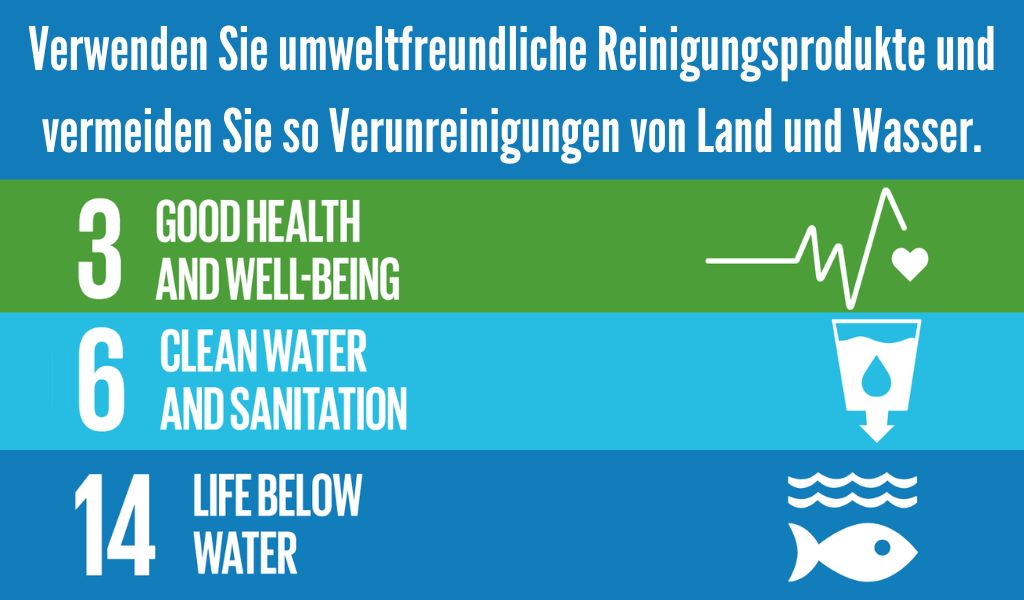Think about reducing water consumption and wastewater. Event organizers, venues and cleaning companies should use only environmentally friendly cleaning products, prevent potentially harmful contamination of land and water, and ensure on-demand, environmentally friendly and clean sanitary facilities, such as toilets, showers, etc., at outdoor venues.
Careful water management protects local watercourses, wildlife and groundwater.
Here's how your actions to reduce water use pay into the SDGs:
- SDG3: Ensure healthy lives and promote well-beingfor allat all ages
Goal 3: Ensure healthy lives and promote well-being for all at all ages
3.9 By 2030, substantially reduce the number of deaths and illnesses from hazardous chemicals and air, water, and soil pollution and contamination - SDG6: Ensure availability and sustainable management of water and sanitation for all
Goal 6: Ensure access to water and sanitation for all
6.3 By 2030, improve water quality globally by reducing pollution, ending the discharge and minimizing the release of hazardous chemicals and substances, halving the proportion of untreated wastewater, and significantly increasing recycling and safe reuse - SDG14:Conserve and sustainably use theoceans, seas and marine resources for sustainable development
Goal 14: Conserve and sustainably use the oceans, seas and marine resources
14.1 By 2025, prevent and significantly reduce all forms of marine pollution, in particular from land-based activities and notably marine litter and nutrient pollution.

Practical tips for reducing water consumption
The event industry has a significant impact on the environment, including water consumption. To ensure water conservation and put water use reduction into action, venues and organizers must take joint responsibility.
An important step is to review current consumption and identify ways to reduce water use. This includes, for example, using low-flow faucets, preventing leaks, and collecting rainwater. E.g., combining solar canopies in parking lots, open spaces, etc. Likewise, organizers and event venues should ensure that water is not wasted unnecessarily, for example by cleaning surfaces with high-pressure cleaners.
In addition, venues and organizers should ensure that the water or wastewater used is of good quality and does not cause harm to the environment or health. This can be achieved by using bio-purification products and monitoring wastewater discharges. In addition, wastewater can also be used for water heat pumps, saving money.
The benefits of reducing water consumption are many. The environment is protected and sustainability is contributed to. Using more efficient water sources - such as rainwater - can also save money. In addition, implementing sustainable water management practices can also improve the image of venues and organizers and help attract customers and guests who are environmentally conscious.
Examples for the reduction of water consumption in event locations
Mercedes-Benz Stadium (Atlanta, USA)
Mercedes-Benz Stadium uses rainwater and gray water to irrigate the playing field and surrounding landscape. This saves the stadium around 2 million liters of drinking water per year and reduces the need for chemical fertilizers.
Hotel & SPA Resort Klosterbräu (Tyrol, Austria)
The Klosterbräu Hotel & SPA Resort relies on a sophisticated rainwater harvesting and treatment system to reduce water consumption. This not only saves the resort money, but also protects the environment by reducing water demand.
World Waterpark (Edmonton, Canada)
The World Waterpark uses a special filtration system that allows the pool water to be cleaned and reused. As a result, the leisure pool saves about 60 million liters of water per year.
Deutsches Theater (Berlin, Germany)
The German Theater relies on sustainable water use for cleaning and irrigation. The use of rainwater and recycled water conserves resources and saves costs.
"GreeNoodle Challenge" at the UNIQA Classic in the Vienna Konzerthaus, Austria
The "GreeNoodle Challenge" at the UNIQA Classic asks visitors to refrain from consuming disposable tableware during the event. Instead, the organizers rely on reusable tableware, thus ensuring a reduction in water consumption and waste. This measure not only protects the environment, but also creates an awareness of sustainable action among visitors.
Now it's your turn - how do you ensure water use is reduced at your event?
Let me know how you have reduced water and wastewater at your event or how you plan to reduce this.
- Are you holding your event at an event venue with a sustainable water use system?
- Do you ask about the quality of the water in the location?
- Are there low flow faucets in the hotels and locations?
Discuss with me - for example directly on my LinkedIn profile.

Get the free Sustainability Rider now and discover what you can do for sustainable events today.


